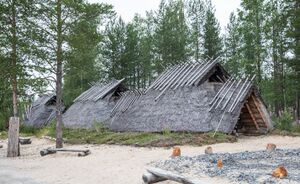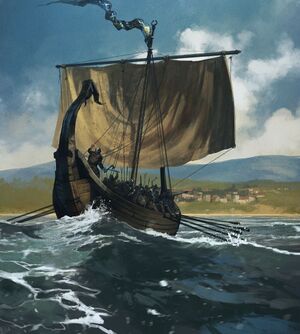Ateenia: Difference between revisions
No edit summary |
No edit summary |
||
| Line 147: | Line 147: | ||
[[File:756f0508d45320ea431e86547db538e5.jpg|thumb|left|Early Ateenian Longboats]] | [[File:756f0508d45320ea431e86547db538e5.jpg|thumb|left|Early Ateenian Longboats]] | ||
The 11th and 12th century in Ateenia was filled with raids. Every few years a group of raiders were gathered that sailed south or east in search for wealth and glory. Hisorical records show that the modern Aleni lands were hit the most. | The 11th and 12th century in Ateenia was filled with raids. Every few years a group of raiders were gathered that sailed south or east in search for wealth and glory. Hisorical records show that the modern Aleni lands were hit the most, followed by raids on the modern Kiyortzan lands that were back then occupied by multiple city states. Around the same time period, the Free Kingdom also got its first herd of livestock to the Ateenian islands through the raids on the Kiyortzan lands. The small herds of cattle that were brought in to the islands, were then raised and their population was increased and through out generations, there were enough cattle to ensure the survival of the livestock that then ensured the future source of beef and milk. | ||
==Culture== | ==Culture== | ||
TBA | TBA | ||
Revision as of 14:45, 14 July 2020
Kingdom of Ateenia Ateenian kuningaskunta | |
|---|---|
| 'Motto: 'Vahvuus, Kunnia, Rauha Strenght, Honour, Peace | |
| Anthem: Kotimaani (My motherland) | |
| Capital | Athano |
| Largest | Ukko |
| Official languages | Ateenian |
| Recognised regional languages | Ateenian, English |
| Religion | Suomenusko |
| Demonym(s) | Ateenian, Ateenians |
| Government | Absolute Monarchy |
• Queen | Ena Kalinka |
• King | Chantuo Sisowath |
| Establishment | |
• The formation of the kingdom | 763 AD |
| Area | |
• | 757,478 km2 (292,464 sq mi) |
| Population | |
• 2020 estimate | 16,243,201 |
• 2017 census | 15,922,091 |
• Density | 21/km2 (54.4/sq mi) |
| GDP (PPP) | estimate |
• Total | $623 billion |
• Per capita | $38,366 |
| Currency | Ateenian Kruunu (AKR) (1AKR = 0,5USD) |
| Time zone | -10 |
| Date format | dd/mm/yyyy |
| Driving side | right |
| Calling code | +89 |
| Internet TLD | .ata |
Ateenia
Ateenia or The Free Kingdom of Ateenia is a state in Anteria with absolute monarchy that is ruled by Queen Ena Kalinka. The Kingdom is composed of 3 islands: The Ukonsaari (Ukko Island), The Paratiisi Island (Paradise) and The Tulivuori Island (Volcano Island).
History
Early History
The first Ateenian people were a fleet of warriors from Rvandonia that crashlanded on the island of Paratiisi in the year 763 AD. They were survivors from the fleet that was meant to go on a raiding trip, but due to a storm, ended up off course and crahslanded in the islands of Ateenia. The 478 Warriors and 398 Shieldmaidens had no choice but to settle down and build homes before winter. Over time the area they crashlanded at, with housing being built, became a village which was then named Ukko, after the flagship of the fleet and the god of thunder. Chief Kaleva Kalinka ended up as the chief of the village, through him making decisions and people having fate in him. Over generations, the population grew and so did the village, untill it became a town and in year 1004 the first settlers embarked from Ukko to found another settlement and such, the town of Ukko founded the Free Kingdom of Ateenia
After that, the Ateenia began spreading rapidly with multiple new villages being founded and with it the new age of the Ateenian people.
The Great Raiding Ages
The 11th and 12th century in Ateenia was filled with raids. Every few years a group of raiders were gathered that sailed south or east in search for wealth and glory. Hisorical records show that the modern Aleni lands were hit the most, followed by raids on the modern Kiyortzan lands that were back then occupied by multiple city states. Around the same time period, the Free Kingdom also got its first herd of livestock to the Ateenian islands through the raids on the Kiyortzan lands. The small herds of cattle that were brought in to the islands, were then raised and their population was increased and through out generations, there were enough cattle to ensure the survival of the livestock that then ensured the future source of beef and milk.
Culture
TBA
Geography
TBA



